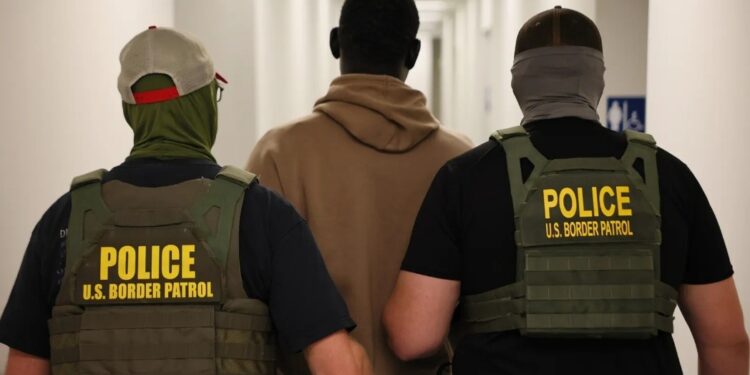As the Ghanaian government defends its controversial agreement to accept West African nationals deported by the U.S. in the name of Pan-African solidarity, new data reveals a disturbing counter-narrative: 2,470 Ghanaian citizens are currently detained in U.S. facilities awaiting their own deportation.
This stark contrast between diplomatic actions and national realities is rapidly escalating into a major political and humanitarian crisis. This is supported by allegations that while the over 2,400 Ghanaians in detention are unable to access consular services, the government is busy attending to foreign deportees who continue to arrive in the country.
The Numbers That Speak Volumes
According to recent figures from the U.S. Department of Homeland Security (DHS), a record 2,470 Ghanaian nationals are locked up in ICE detention centres, facing imminent removal from the United States. This marks a significant increase driven by the Trump administration’s accelerated “Global Enforcement Initiative.”
While the government in Accra is extending a hand to deportees from Nigeria, Gambia, and other West African states—justifying the move on “humanitarian grounds” and the ECOWAS free movement protocol—critics are asking a fundamental question: What about our own?
Lack of Consular Support for Our Own
Allegations of inadequate support further complicate the plight of the thousands of Ghanaians detained. The detention figure—which the government is aware of, citing data from U.S. authorities—underscores a perceived failure to provide robust and timely consular assistance to citizens facing removal.
Ghana’s own mission in Washington has previously highlighted challenges in securing the necessary paperwork and due process for its nationals being deported. Yet, the recent diplomatic effort has been overwhelmingly focused on the “third-country” deportees.
The Paradox: Solidarity vs. Sovereignty
The government has successfully negotiated the lifting of U.S. visa restrictions on Ghanaians, a move some link directly to the agreement to accept the third-country deportees.
However, this diplomatic win comes at a high human cost: Ghana is receiving non-Ghanaians whom the U.S. courts deemed too unsafe to send home, in what a U.S. judge called an “end-run” around legal protection.
Thousands of Ghanaian citizens, some with deep ties to the U.S., face the trauma of deportation, often with limited legal and consular backing from their own government.
For many observers, the government’s readiness to become a “deportation hub” for its West African neighbours, while 2,470 of its own citizens languish in foreign detention, represents a profound misplacement of national priority and a breach of the social contract. The ongoing situation remains a critical test of the nation’s leadership and humanity.






